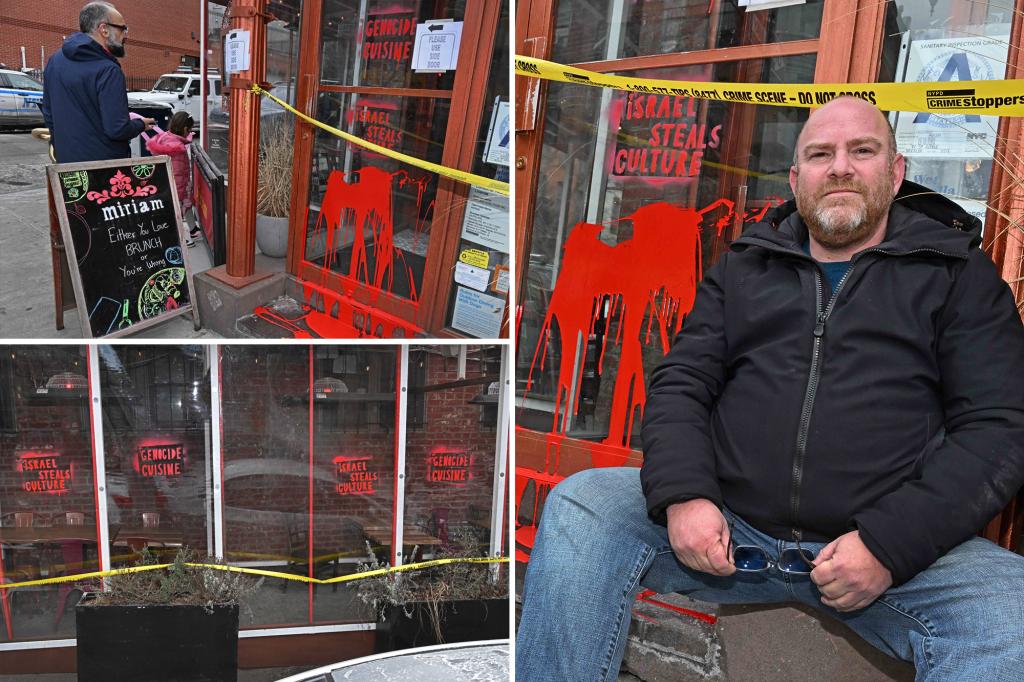The act of vandalism against Miriam, an Israeli restaurant in Brooklyn’s Park Slope neighborhood, stands as a stark reminder of the escalating anti-Semitic sentiments that have unfortunately become increasingly prevalent in recent times. The perpetrators, cloaked in anonymity beneath hoods and masks, defaced the restaurant’s windows and doors with hateful messages, including “Genocide cuisine” and “Israel steals culture.” Their actions, captured on security footage, depict a premeditated act of malice, with one individual serving as a lookout while the others hurriedly painted the offensive slogans and splashed red paint across the entrance, mimicking spilled blood. This blatant display of hatred aimed at a local business owned by an Israeli immigrant has understandably left the owner, Rafael Hasid, deeply troubled and questioning the motives behind such animosity.
For Hasid, this incident marks the second time one of his restaurants has been targeted by anti-Israel agitators. Two years prior, his Upper West Side location of Miriam suffered a similar attack. Beyond the physical defacement of his property, Hasid has endured a barrage of threatening phone calls and online harassment, with negative reviews flooding in from individuals who have never even patronized his establishments. The cumulative effect of these experiences underscores a disturbing trend of escalating anti-Semitism, not just in New York City, but across various parts of the world. It raises concerns about the safety and security of Jewish communities and businesses, and highlights the need for greater awareness and action to combat such prejudice.
Despite the emotional toll and the inconvenience, Hasid made the courageous decision to keep the hateful messages visible on his restaurant’s facade. Rather than immediately erasing the evidence of this bigotry, he opted to leave it on display for the public to witness the stark reality of hate that exists within their community. This deliberate act of defiance aims to spark a conversation, to force people to confront the uncomfortable truth that anti-Semitism is not an abstract concept, but a palpable threat impacting real people and their livelihoods. By leaving the graffiti untouched, Hasid transforms his vandalized restaurant into a powerful symbol of resistance, a testament to his resolve not to be silenced or intimidated by hate.
The public’s response to Hasid’s decision has been overwhelmingly positive and supportive. People from all walks of life have rallied around him and his restaurant, offering donations to help with the cleanup, expressing their condolences, and, perhaps most importantly, patronizing Miriam. The outpouring of support serves as a beacon of hope amidst the darkness of prejudice. It demonstrates the power of community and solidarity in standing up against hate. Even prominent figures like US Senator Chuck Schumer have visited the restaurant, placing orders and showing their solidarity with Hasid and the wider Jewish community.
The incident has prompted a police investigation, with officers stationed near the restaurant to prevent further acts of vandalism. This response, while necessary, also underscores the broader societal challenge of addressing the root causes of anti-Semitism. The vandalism at Miriam is not an isolated incident; it is part of a larger pattern of increasing anti-Semitic acts that have surged since the Hamas attack on Israel in October 2023. This escalation of tensions in the Israeli-Palestinian conflict has unfortunately fueled a rise in anti-Jewish sentiment globally, underscoring the interconnectedness of these issues and the need for nuanced understanding and peaceful resolutions.
The attack on Miriam restaurant is a microcosm of the larger struggle against hate and intolerance. It highlights the vulnerability of minority communities and the importance of speaking out against prejudice in all its forms. Hasid’s decision to leave the hateful messages visible serves as a powerful reminder that silence is not an option in the face of bigotry. It is a call to action for individuals, communities, and governments to work together to create a more just and inclusive society where everyone, regardless of their background or beliefs, can feel safe and respected. The outpouring of support for Hasid and his restaurant offers a glimmer of hope that, even in the darkest of times, empathy and solidarity can prevail. It reinforces the belief that by standing together, we can overcome hate and build a better future for all.










